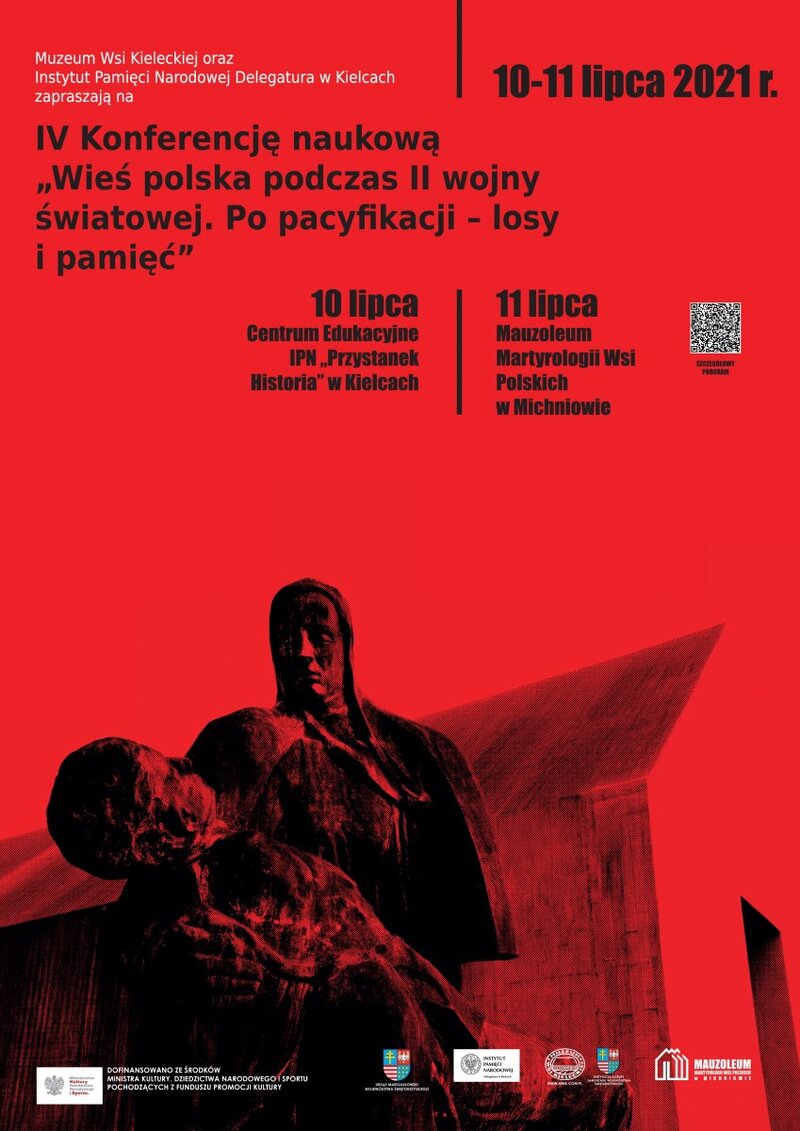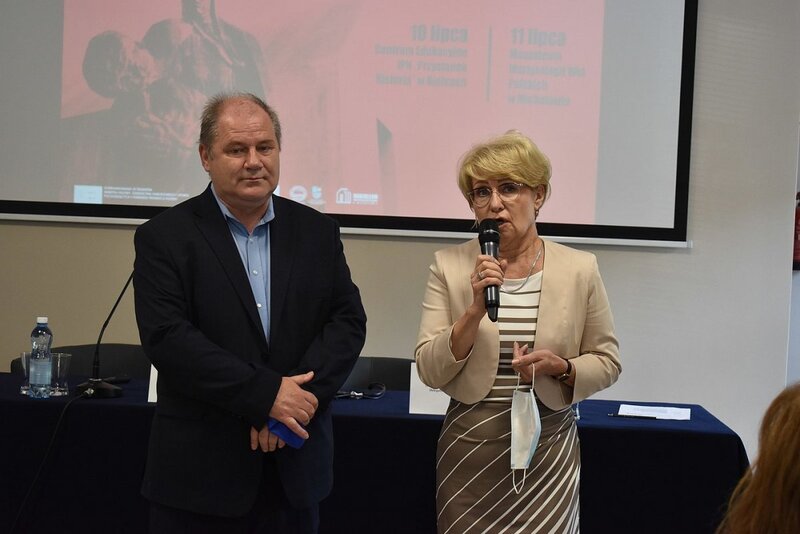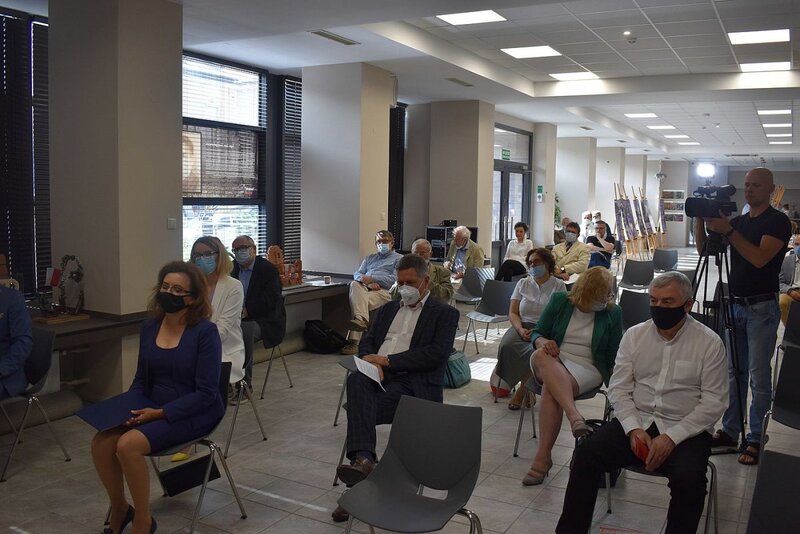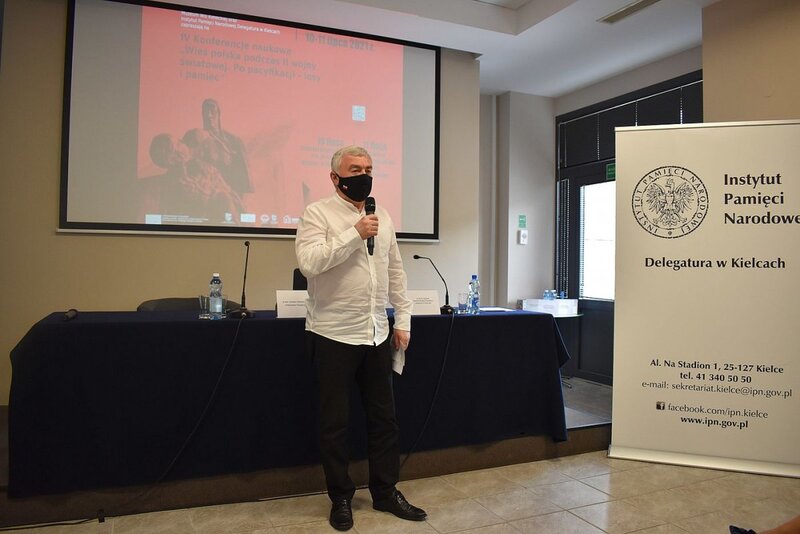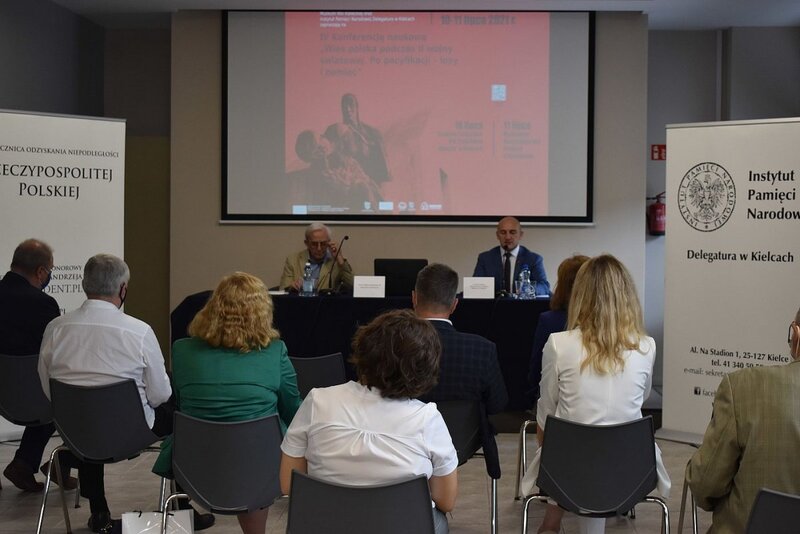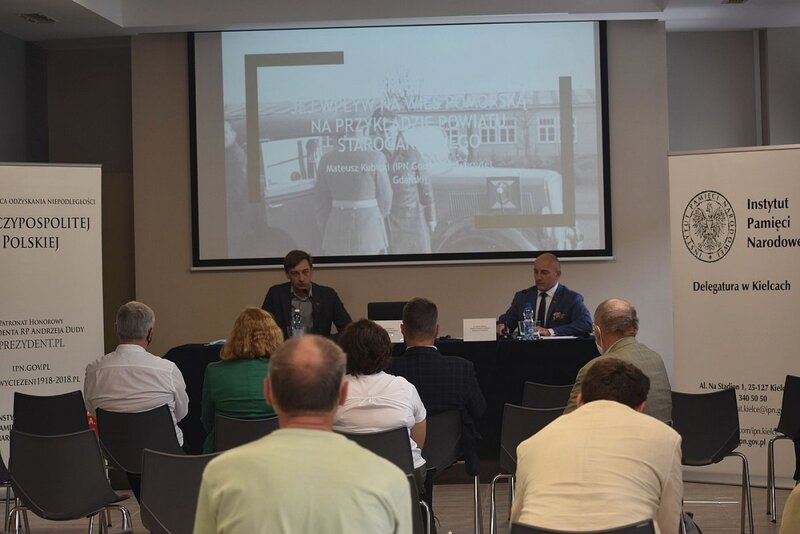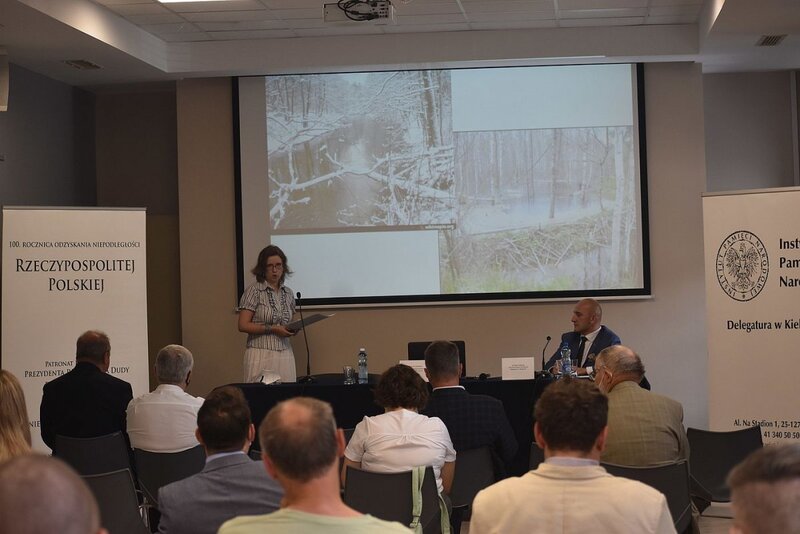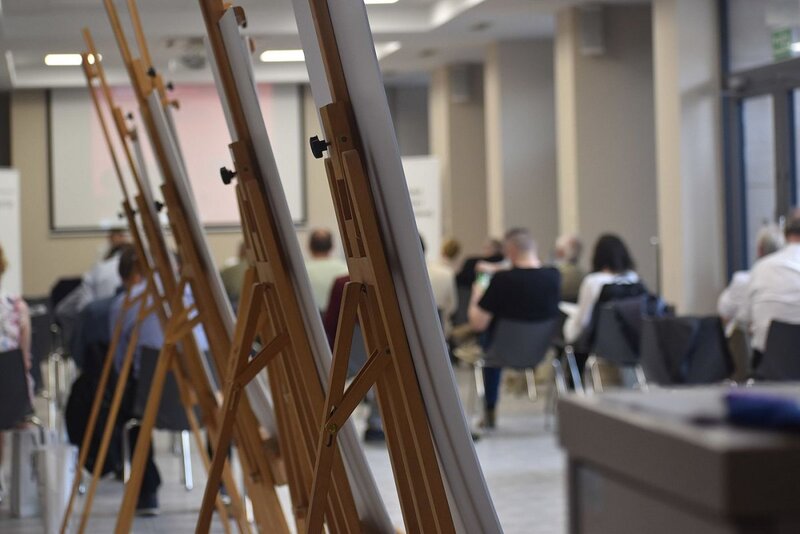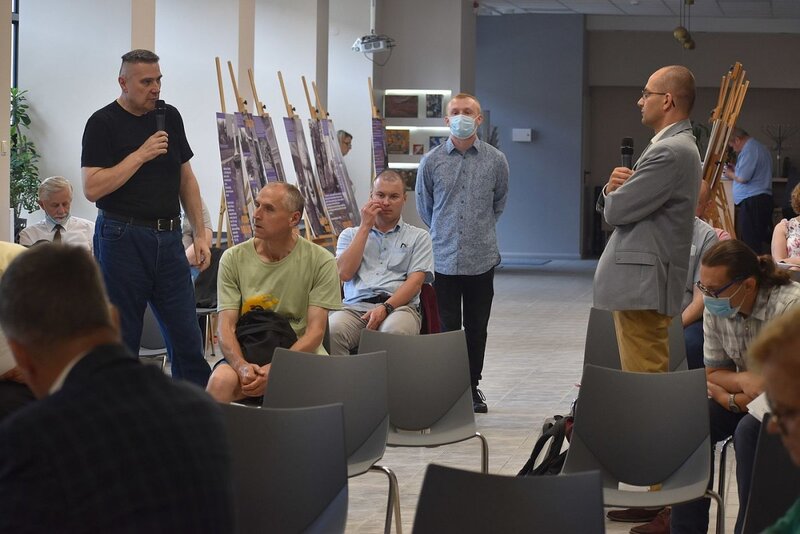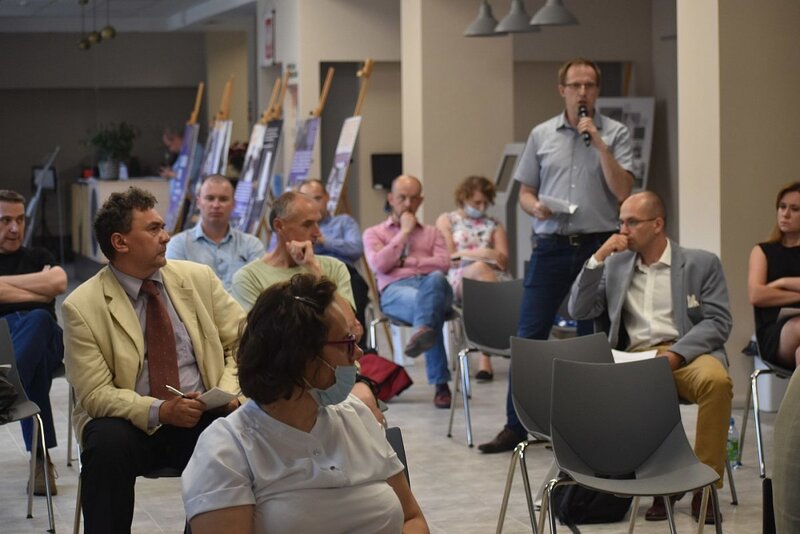This conference was an opportunity to discuss various issues related to the victims of the repressions and their later fate, the reality following the pacification operations, and the process of rebuilding burnt villages. This year’s edition focused on an individual– a witness to German and Soviet cruelty. Michniów in the Kielce province became a symbolic place, commemorating the martyrdom of all Polish villages pacified during World War II.
“Michniów was a village that would never be rebuilt. This was the intention of the Germans. Not only did they burn down the village murdering its inhabitants, but they also forbade its reconstructiom. This was one of many Polish villages pacified this way. Had it not been for the survivors and others, their determination and willingness to bear witness to what had happened, this community would most probably have never been rebuilt. Especially in eastern Poland, there are many such forgotten villages,” said Dorota Koczwańska-Kalita, Ph.D., Head of the IPN’s Kielce Sub-branch.
The day before the celebrations of the Polish Countryside Martyrdom Day, some 30 academics from around Poland debated on the German occupation policy and pacification operations in the villages in the Lublin region and in the Świętokrzyskie Mountains in the years 1939–1945. They also talked about the activities conducted by the Home Army and Peasants’ Battalions towards the Ukrainians in March 1944, the situation of children in the context of displacement and pacification operations in the Zamość region.
The conference was organised by the IPN’s Kielce Sub-branch and the Museum of the Kielce Countryside.
CONFERENCE PROGRAMME
Day 1
10 July 2021 (Saturday), the IPN’s “History Point” Educational Center in Kielce (5 Warszawska Street)
· 9.00 Conference opening and introductory remarks from Dorota Koczwańska-Kalita, Ph.D. (Institute of National Remembrance, Kielce Sub-branch), Tadeusz Sikora (Museum of the Kielce Countryside)
· 9.15 Stanisław Meducki, Ph.D., Ph.Sc. (Kielce University of Technology), German occupation policy towards the Polish agriculture (1939–1945)
· 9.35 Waldemar Grabowski, Ph.D.,Ph.Sc. (Institute of National Remembrance in Warsaw), Government Delegation for Poland towards the Polish countryside. Current state of knowledge, research proposals
· 9.55 Mateusz Kubicki (Institute of National Remembrance, Gdańsk Branch), German occupation in the years 1939–1945 and its impact on the Pomeranian countryside on the basis of an example of Starogard district
· 10.15 Maciej Ambrosiewicz (Augustów-Suwałki Scientific Society), Sopoćkinie town and its surroundings in the years 1939-1945
· 10.35 Soraya Kuklińska, Ph.D. (Institute of National Remembrance in Warsaw), The Naliboki massacre
· 10.55 Discussion
· 11.15 Coffee Break
· 11.35 Dominik Szulc, Ph. D. (Institute of History of the Polish Academy of Sciences), Pacification and what next? Places of isolation for victims of pacification in the villages of Zamość and Kraśnik districts
· 11.55 Beata Kozaczyńska (Siedlce University of Natural Sciences and Humanities), Children under the shadow of displacement and pacification operations in the Zamość region (1942–1943)
· 12.15 Rafał Drabik, Ph.D. (Institute of National Remembrance in Warsaw), Participation of the 1st SS Brigade in the pacification operations in the Lublin region
· 12.35 Sławomir Jan Maksymowicz, Ph.D. (State Archives in Olsztyn), Pacification of villages in the Lublin region and in the Świętokrzyskie Mountains in 1939–1945. Prevention and operation methods applied by Polish partisan units
· 12.55 Mariusz Sawa, Ph.D. (Polish-Ukrainian-Canadian Scholarship Foundation "Kalyna"), Retaliation or pacification? The Home Army and the Peasants' Battalions against Ukrainian fellow citizens in March 1944
· 13.15 Discussion
· 13.35 Break
· 14.35 Sebastian Piątkowski, Ph.D., Ph.Sc. (Institute of National Remembrance in Warsaw), "Only willows will stay in the village ...". About the alleged and actual initiators of the pacification of Antoniówka village near the Vistula River in November 1943
· 14.55 Agnieszka Zięba-Dąbrowska (Jan Kochanowski University in Kielce), Pacification of Dębowe Pole village in Sienno municipality
· 15.15 Piotr Kacprzak (Regional Directorate of State Forests in Radom), Forests, foresters and forest settlements in the armed underground and the resistance during World War II in the Świętokrzyskie region – fight and memory
· 15.35 Antoni Dąbrowski (Regional Culture Foundation "Radostowa" in Starachowice town), Pacification of Zawał and Mołdava villages
· 15.55 Discussion
· 16.15 Coffee break
· 16.35 Mieczysław Kopeć (Krosno Odrzańskie town), Rural resistance movement "Roch" in the Przeworsk district in the years 1939-1944 in the light of archival materials
· 16.55 Piotr Olechowski (Institute of National Remembrance in Warsaw), Inhabitants of the Galician coutryside, as targets of repression by the Soviet security apparatus during World War II
· 17.15 Paweł Glugla, Ph.D. (Tarnów), "Dies Irae" 1944. Pacification of the village of Jamna in the Zakliczyn municipality – genesis, personal losses and memory
· 17.35 Filip Gańczak, Ph.D. (Institute of National Remembrance in Warsaw), Pacification of the village of Bobrowa in the Dębica district on 9 July 1943. Massacre and memory
· 17.55 Discussion
Day 2
11 July 2021 (Sunday), Mausoleum of Polish Rural Martyrology in Michniów
· 9.30 Dorota Koczwańska-Kalita, Ph.D. (Institute of National Remembrance, Kielce Sub-branch), Tadeusz Sikora (Museum of the Kielce Countryside), Greeting to conference participants and starting the session
· 9.45 Monika Tomkiewicz, Ph.D.,PhSc. (Institute of National Remembrance in Warsaw), Retaliation as one of the methods of terror applied by the Germans in Polish villages in the Vilnius region in the years 1942-1944 on the basis of an example of the pacification of the villages of Pirciupie, Krapiwno, Olkieniki, Połuknia and Święciany
· 10.05 Barbara Kościelny (Institute of National Remembrance, Rzeszów Branch), Beyond recollection. Forgotten and unknown crimes of the Organization of Ukrainian Nationalists / Ukrainian Insurgent Army (OUN-UPA) in the Carpathian districts of the Lwów and Stanisławów provinces
· 10.25 Krzysztof Bąkała (Museum of Independence in Warsaw), "If I forget about them – God in the sky, forget about me". Commemoration of the genocide committed by the Ukrainian nationalists on the Polish population on the basis of an example of the Museum of Independence
· 10.45 Renata Knyspel-Kopeć, Ph.D. (Institute of National Remembrance in Warsaw), Terror in the countryside around Wołkowysk town (1942-1944) in the light of the documents from the trial of Feliks Obuchowicz vel Stanisław Lisowski
11.05 Tomasz Bereza (Institute of National Remembrance, Rzeszów Branch), Połowce village in the Czortków district in the years 1939–1945. Remembering the crimes committed by the OUN-UPA against the Polish inhabitants of a Podolian village
11.25 Discussion
11.45 Coffee break
12.05 Professor Vasyl Hułaj (Lviv Polytechnic National University), Polish rural population of the Galicia at the end of World War II: deconstruction of Soviet and contemporary Ukrainian historiography
12.25 Adam Kuź (Stutthof Museum in Sztutowo – Piaśnica Museum in Wejherowo), Terminology of the scientific and journalistic description of crimes committed against the Polish population by the OUN / UPA units in the years 1939–1945
12.45 Izabela Bożyk, Ph.D. (Kielce Scientific Society), Pacification of villages in the Świętokrzyskie region in the local memory and awareness of young people from Kielce secondary schools on the 76th anniversary of the end of World War II
13.05 Dominika Siemińska, Ph.D. and Michał Nowak (Institute of National Remembrance in Warsaw), Searching for the victims of totalitarian systems as a contribution to commemorating the martyrdom of the Polish countryside in the Second Polish Republic
13.25 Tomasz Andrzej Nowak, Ph.D. (The Stanisław Sankowski Regional Museum in Radomsko), Crimes of German troops in selected villages of the Radomsko district in the first days of September 1939 and their commemoration
13.45 Ewa Kołomańska (Museum of the Kielce Countryside – Mausoleum of Polish Rural Martyrology in Michniów), The need for remembrance – changes in the way of commemorating historical events
14.05 Discussion
14.25 End of conference and closing remarks from Dorota Koczwańska-Kalita, Ph.D. (Institute of National Remembrance, Kielce Sub-branch), Tadeusz Sikora (Museum of the Kielce Countryside)
14.45 Visiting the Mausoleum of Polish Rural Martyrology in Michniów
